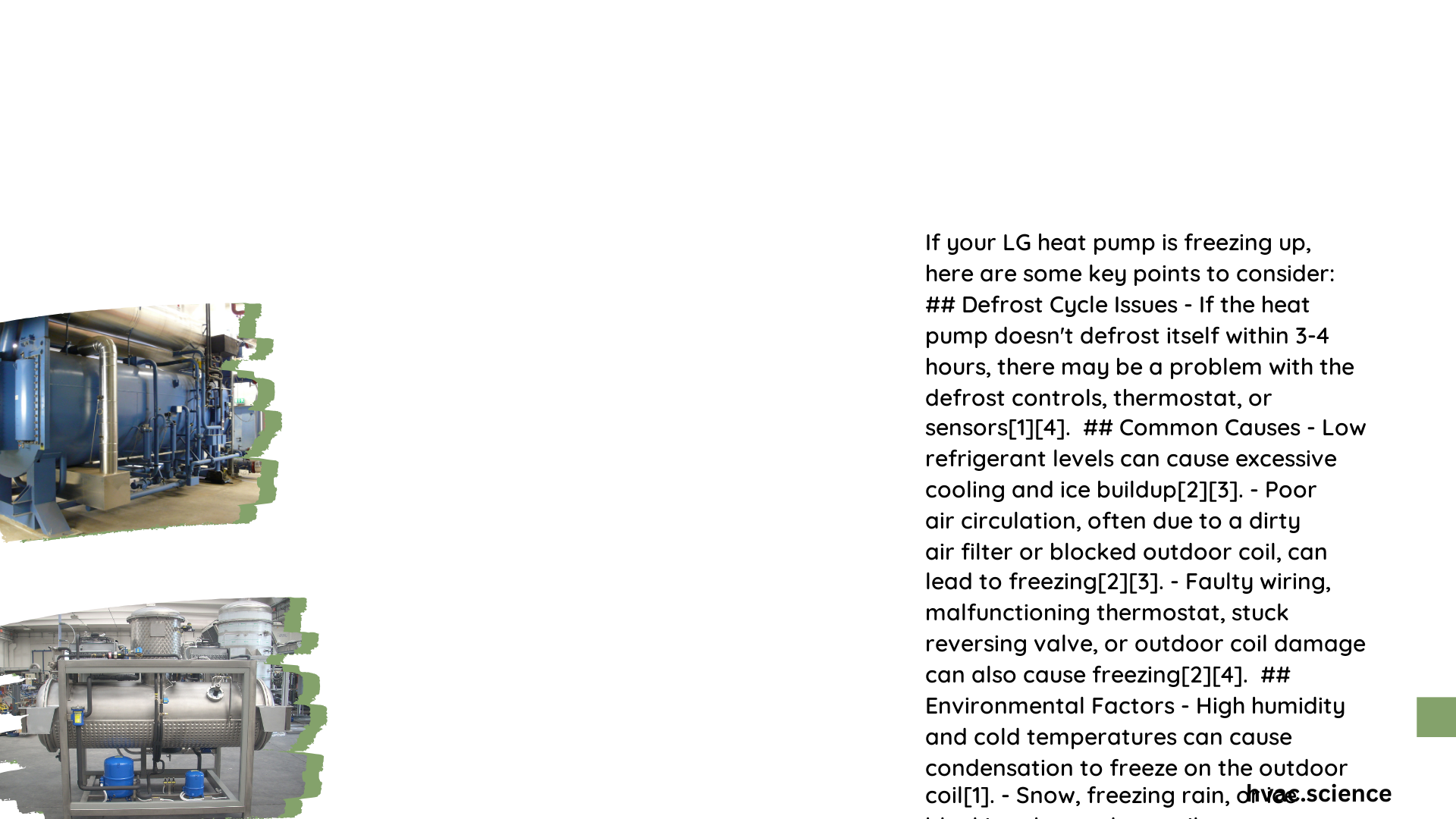LG heat pump freezing up is a common issue that can significantly impact the system’s efficiency and performance. This problem occurs when ice accumulates on the outdoor unit, preventing proper heat exchange. Causes include poor airflow, low refrigerant levels, faulty defrost mechanisms, and extreme weather conditions. Understanding the reasons behind this issue and knowing how to address it can help maintain your LG heat pump’s optimal functioning and extend its lifespan.
What Are the Main Causes of LG Heat Pump Freezing?
Several factors can contribute to an LG heat pump freezing up:
- Poor air circulation
- Low refrigerant levels
- Malfunctioning defrost control board
- Dirty coils and filters
- High humidity and extreme temperatures
Let’s examine each of these causes in detail:
1. Poor Air Circulation
Inadequate airflow around the outdoor unit can lead to freezing issues. This can be caused by:
- Blocked outdoor evaporator coil
- Malfunctioning outdoor fan motor
- Obstructions like leaves, snow, or overgrown vegetation
When air can’t flow freely, the heat exchange process is impaired, leading to ice formation on the coils.
2. Low Refrigerant Levels
A refrigerant leak can cause the system to lose its ability to absorb heat effectively. This results in:
- Reduced system performance
- Increased energy consumption
- Ice buildup on the coils, especially in temperatures below 32°F
Low refrigerant levels can also prevent the heat pump from defrosting properly, exacerbating the freezing issue.
3. Malfunctioning Defrost Control Board
The defrost control board is responsible for initiating the defrost cycle. If it fails:
- The defrost mode may not engage when needed
- Thick ice can accumulate on the coil
- The system may rely more on auxiliary heat, increasing energy bills
4. Dirty Coils and Filters
Dirt and debris on coils and filters can:
- Impede airflow
- Reduce heat transfer efficiency
- Cause coils to become too cold and freeze
Regular cleaning and maintenance are crucial to prevent this issue.
5. High Humidity and Extreme Temperatures
Environmental factors can also contribute to freezing:
- High humidity can lead to excess moisture condensation on coils
- Extreme temperatures (hot or cold) can make the heat pump work harder, potentially leading to freezing
How Does the LG Heat Pump Defrost Cycle Work?

The defrost cycle is a crucial feature of LG heat pumps designed to prevent ice buildup. Here’s how it operates:
- Activation: Triggered by an internal thermostat or defrost control board
- Threshold: Typically engages when outdoor coil temperature drops below 32°F
- Frequency: Occurs every 30-60 minutes, depending on conditions
- Process: Switches to air conditioning mode to heat the outdoor coil and melt ice
| Defrost Cycle Component | Function |
|---|---|
| Internal Thermostat | Detects coil temperature |
| Defrost Control Board | Initiates defrost cycle |
| Reversing Valve | Switches system to AC mode |
What Are the Signs of Low Refrigerant Levels?
Low refrigerant levels can contribute significantly to freezing issues. Look out for these indicators:
- Reduced system performance
- Increased energy bills
- Frequent or prolonged ice buildup on coils
- Hissing sounds from the system
- Reduced airflow
- Inability to reach set temperature
Quantitative Threshold: Refrigerant levels should be within 10% of the manufacturer’s recommended levels. For example, if the recommended level is 100 psi, anything below 90 psi may indicate a problem.
How to Troubleshoot an LG Heat Pump Freezing Issue?
Follow these steps to diagnose and potentially resolve freezing problems:
- Visual Inspection
- Check for ice or frost buildup on the outdoor unit
-
Remove any visible blockages (leaves, snow, debris)
-
Air Filter Check
- Inspect air filters
-
Clean or replace if dirty
-
Thermostat Verification
- Ensure correct thermostat settings
-
Check for proper thermostat function
-
Refrigerant Level Check
- If you suspect a leak, call a certified HVAC technician
-
Do not attempt to handle refrigerant yourself
-
Defrost Control Board and Reversing Valve Inspection
- If defrost cycle isn’t engaging, these components may be faulty
- Professional diagnosis and replacement may be necessary
Tools Required:
- Screwdriver
- Wrench
- Vacuum cleaner
- Refrigerant leak detector (for professionals)
- Pressure gauges (for professionals)
Potential Costs:
| Service | Estimated Cost Range |
|---|---|
| Air filter replacement | $10 – $50 |
| Defrost control board repair/replacement | $200 – $500 |
| Refrigerant leak repair and recharge | $100 – $300 |
| Professional service call | $75 – $200 |
How to Prevent LG Heat Pump Freezing?
To minimize the risk of your LG heat pump freezing up:
- Schedule regular maintenance checks
- Keep the area around the outdoor unit clear of debris
- Clean or replace air filters monthly
- Ensure proper insulation of refrigerant lines
- Monitor system performance and address issues promptly
By following these preventive measures and understanding the causes of freezing, you can maintain your LG heat pump’s efficiency and extend its lifespan.
